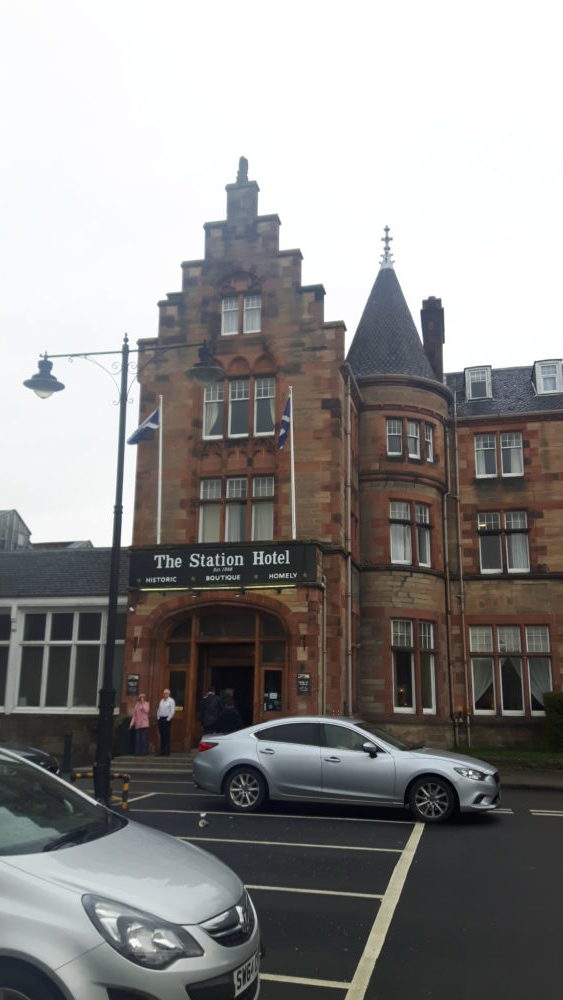
The Station Hotel in Perth: a very nice place to spend a day, with nice coffee and lovely chocolate orange cake!
It was a great opportunity to network with people in similar roles at other Scottish churches, and to hear the latest communications-related news, tips and advice from Dr Rory Castle Jones, the Unitarians UK Communications Officer.
Communications: Traditional and Modern
Rory started off by comparing Traditional and Modern Communications channels.
Traditional channels of communication would include:
- Leaflets
- Posters
- Press releases
- Newsletters
Modern channels of communication would include:
- Websites
- Social media
- Blogs
- Email lists
So, Why should Churches use Social Media?
The UK has 45 million social media users, who on average use social media for 1 hr 50 minutes per day.
Here are some of the things churches can use social media for:
- Publicising services
- Publicising events
- Connecting with the community
- Explaining your faith
It seems very appropriate to include a tweet from Rory, showing the workshop getting started:
Scottish Unitarians’ Communications workshop getting underway in Perth, with inspiring opening by Rev Rob Whiteman on communications in a time of #coronavirus fear & confusion @UKUnitarians pic.twitter.com/kyawdhaqyI
— Rev. Rory Castle Jones (@RoryCastle) March 14, 2020
It was unfortunately very relevant for me that Rory mentioned Coronavirus fears, because in the course of the day my church minister actually let us know that due to the ongoing updates in the coronavirus situation all our services and events would be cancelled with immediate effect – meaning I had to get on my laptop immediately with the hotel Wi-Fi to update our website, our upcoming services list and our Twitter account from the news he had posted on Facebook.
This meant that I actually had to be doing social media posting against the clock in the middle of the social media workshop! But it did at least prompt me to ask Rory about something that has been annoying me for a couple of years:
When you write a post that includes a link on your Facebook page, is there a way to have your own words about the link stay included when people share your post?
As things stand, people try to share our posts, but if they include a link to something else, it’s only that link that is shared, not our take on it.
It’s a bit of a mixed feeling when an expert agrees that yes, this is an annoying feature, and there’s only a partial fix for it. This is the way to include your part of the post, but you’d have to somehow get your page visitors to do it, and it’s only available on laptops, not phones:
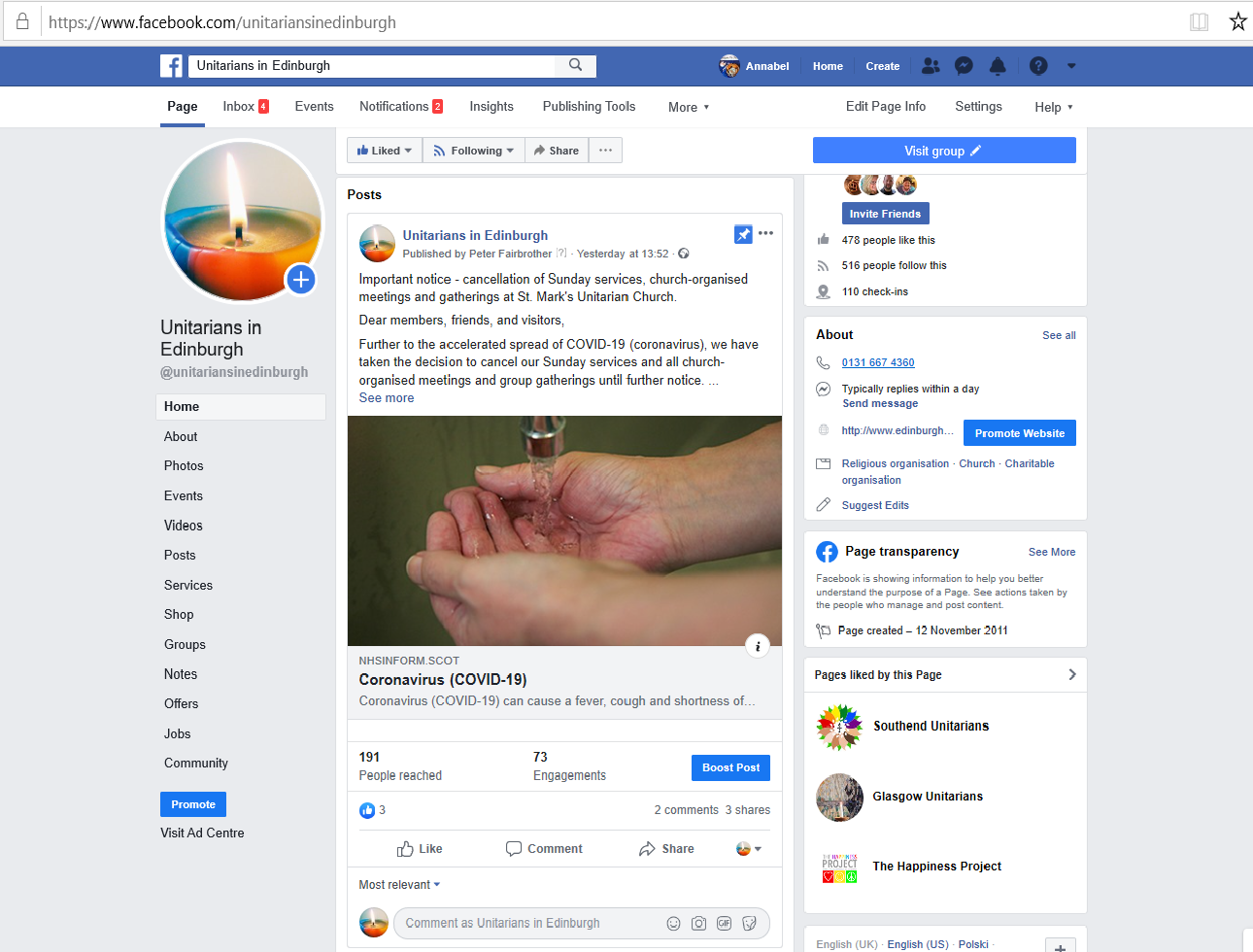
Here’s our Facebook page, with the post I want to share
Here we have a very informative message that needs to be shared, but the useful link at the bottom is effectively preventing that from happening, because unfortunately, and annoyingly, this is Facebook’s default method for sharing posts:
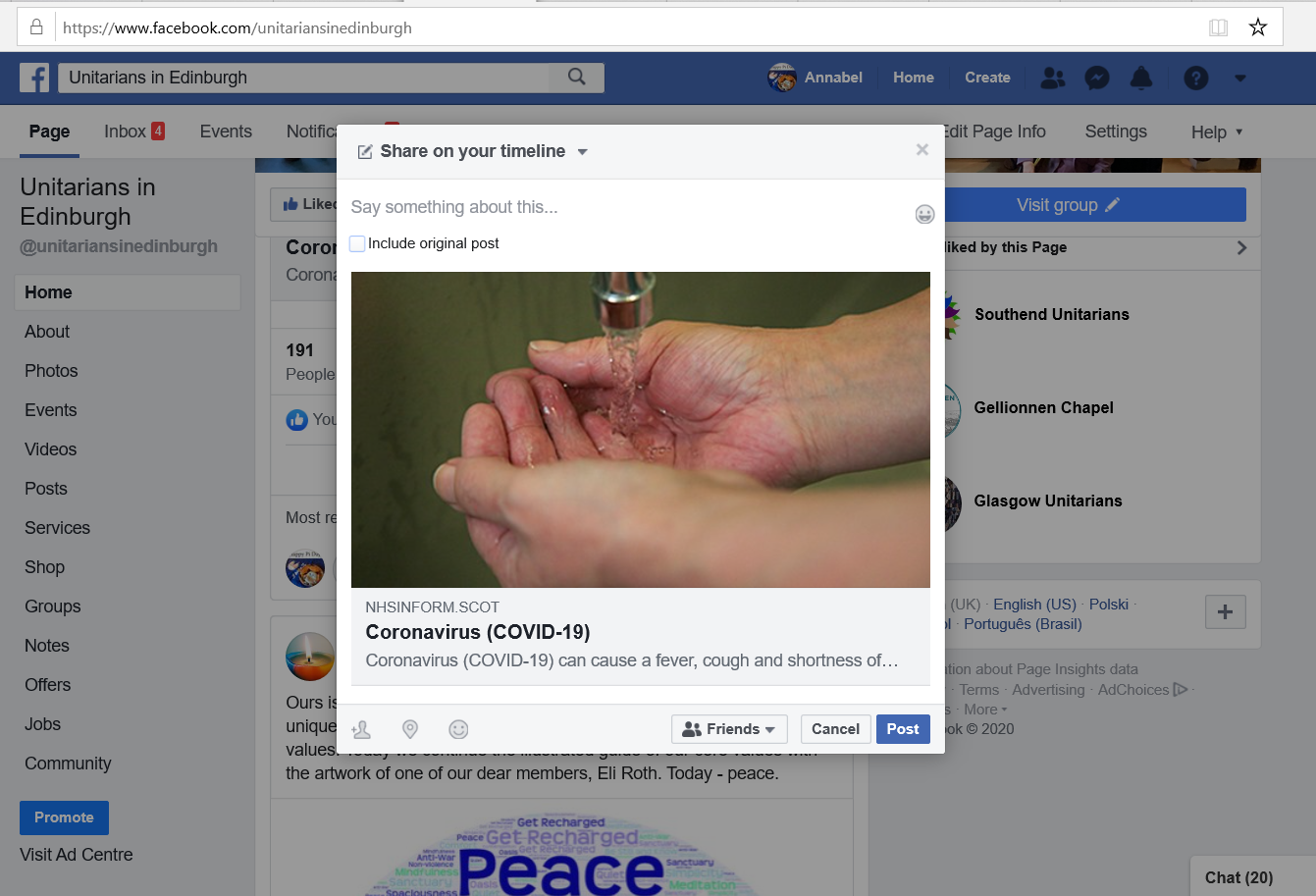
There’s the link the minister posted, but where did our part of the post go?
That tiny, unobtrusive box at the top that says ‘Include original post’ is the answer: tick that box and the share includes your part of the post as well as the link, but it’s out of the way and inconspicuous, and not even there on mobiles. And it’s your visitors that have to do it.
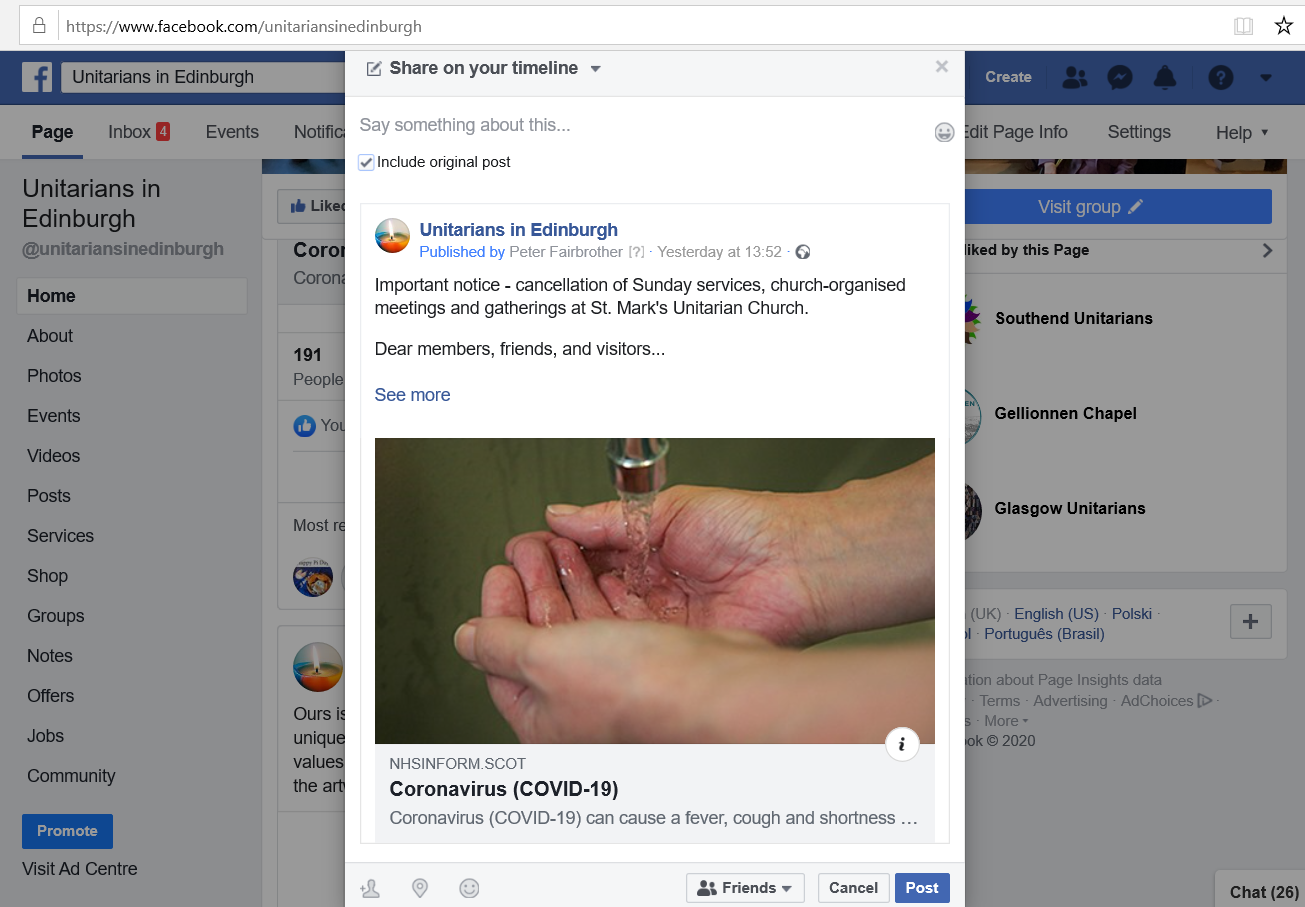
See that tiny, inconspicuous checkbox?
Somehow, to get our posts shared properly, we have to keep reminding everyone that shares them to tick that box.
It’s worth it though: and meanwhile, it was a very proud moment for us to see our page listed as one of the top 10 Unitarian Facebook Pages in the country!
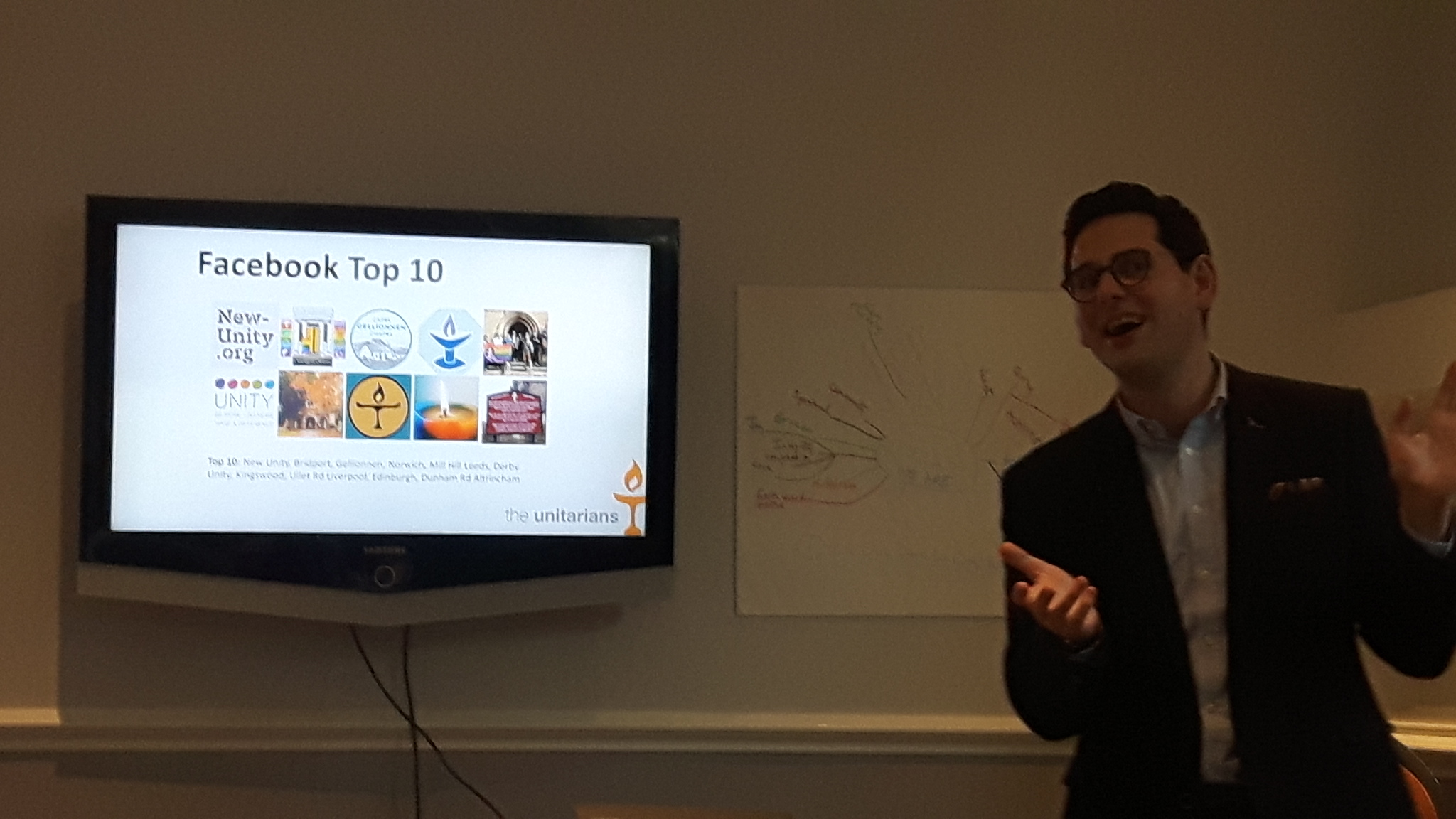
Rory Castle Jones introduces the Top 10 Unitarian UK Facebook Pages:
and that’s ours with the orange and blue candle! 🤩
Rory gave us his tips for creating a successful Facebook Post:
- Start with a clear idea, and explain it simply
- Use an easy-to-use website like Canva to assemble an image, text and logo to create your post.
- Publish at a time when most of your visitors are online. This can be looked up in Facebook’s Page Insights, but in general Rory recommended 6pm on Saturdays.
- Engage with visitors who comment on your post after it’s published.
Taking Good Photos
We were reminded that it’s important to actually have good photos to work with.
Photos of people always work better than photos of empty churches, except when the church is an iconic building and you’re including a photo as part of your directions to show where it is.
It also gives a much friendlier impression to have natural looking photos rather than staged photos, but you have to get permission before putting people’s photos online, and it’s best not to use photos of children.
Video Clips
He also suggested using short video clips, 10-15 seconds long. Some good subjects for these could be someone lighting the chalice, or the congregation singing part of a hymn.
Written Communication
We also did some group exercises on other aspects of communication. To start off, we were given the task of creating a short tagline for one of the Scottish Unitarian Churches.
Our group produced a colourful mind map of words about the Unitarian church and our activities, beliefs and values. We wanted to use all the coloured pens we were given, to represent the diversity that is a core Unitarian value.
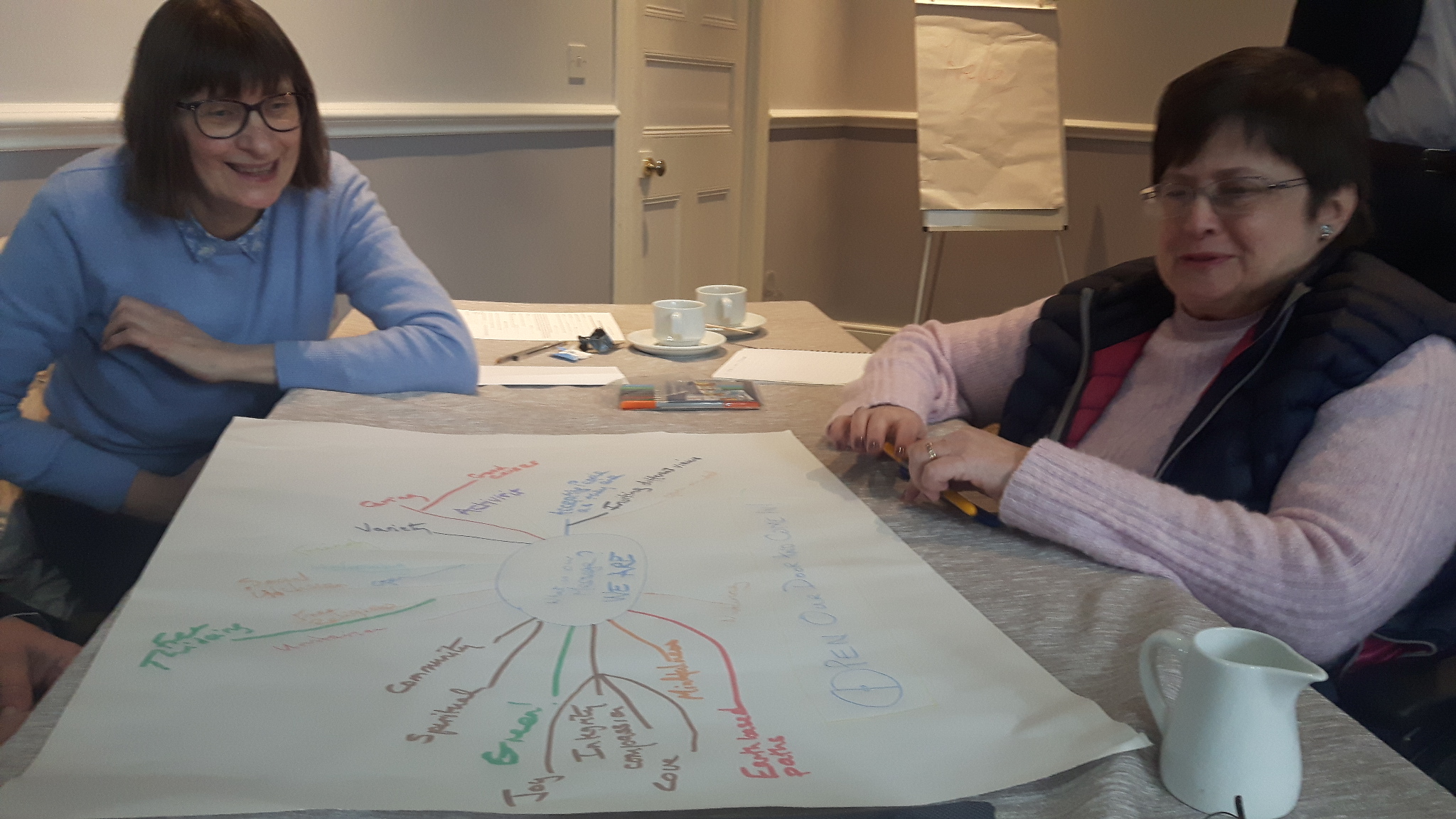
Mind mapping words about our churches
Next, we looked through an envelope full of taglines from different churches, and came up with a new tagline for the Dundee church: “Open our door and come in”, with a doorway drawn in the O.
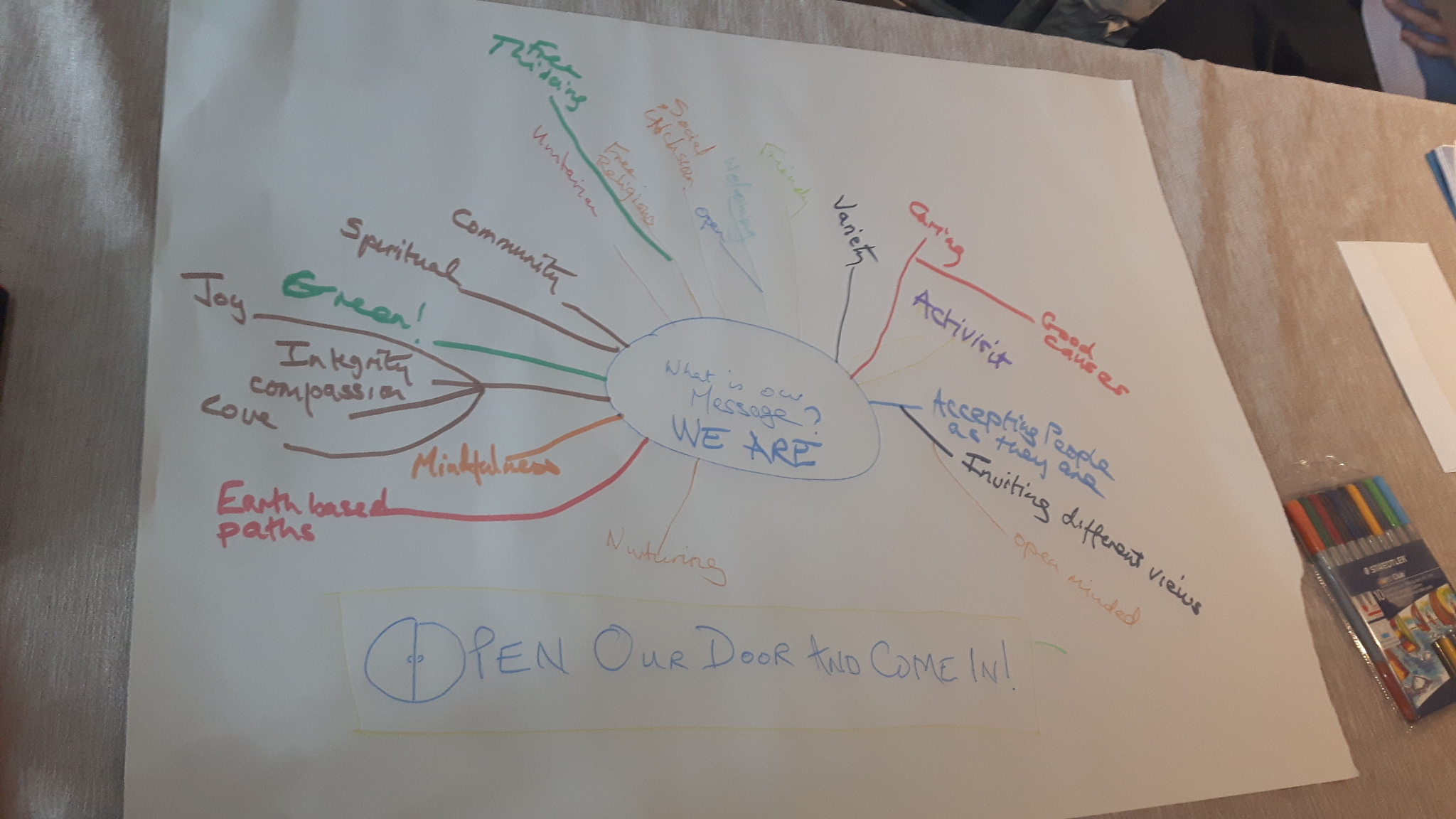
Our mind map and tag line: Who wouldn’t want to open the door and come in!
Websites
I liked this quote about websites:
“An effective website is one that clearly communicates who you are, what you do, and why it matters. It is one of the most visible communications tools a congregation has. Even with the rise of social media, websites remain essential: they are your virtual front door.”
‘Website Creation Help for Congregations’
(Unitarian Universalist Association)
Rory Castle Jones also spoke about how testimonials can add great value and personal appeal to websites, and he set us another practical exercise to write testimonials ourselves.
Here are some of the results:
Moving personal testimonies and inspiring visions of church & community from Scottish Unitarians workshop today in #Perth 🏴❤️ #spirituality #community #faith pic.twitter.com/h7y05P5uHI
— Rev. Rory Castle Jones (@RoryCastle) March 14, 2020
A Poem
Rev Rob Whiteman from Dundee read a very nice poem about technology, which I hope to add here later when we all get it by email.
Why were we there?
“To understand how we can use different communications tools to enhance and grow our congregations.”
Our role is to help grow our congregations, both in numbers, and in other ways, like connecting with our local communities, charities and social justice campaigns, and in terms of spiritual growth through spreading our message.
All in all, it was an interesting day, nice to spend some time doing the workshop activities with people from my church, and to meet some people who were playing similar roles in other churches.
Links
- Unitarians in Edinburgh: website
- Unitarians in Edinburgh: Facebook page
- Unitarians in Edinburgh: Twitter
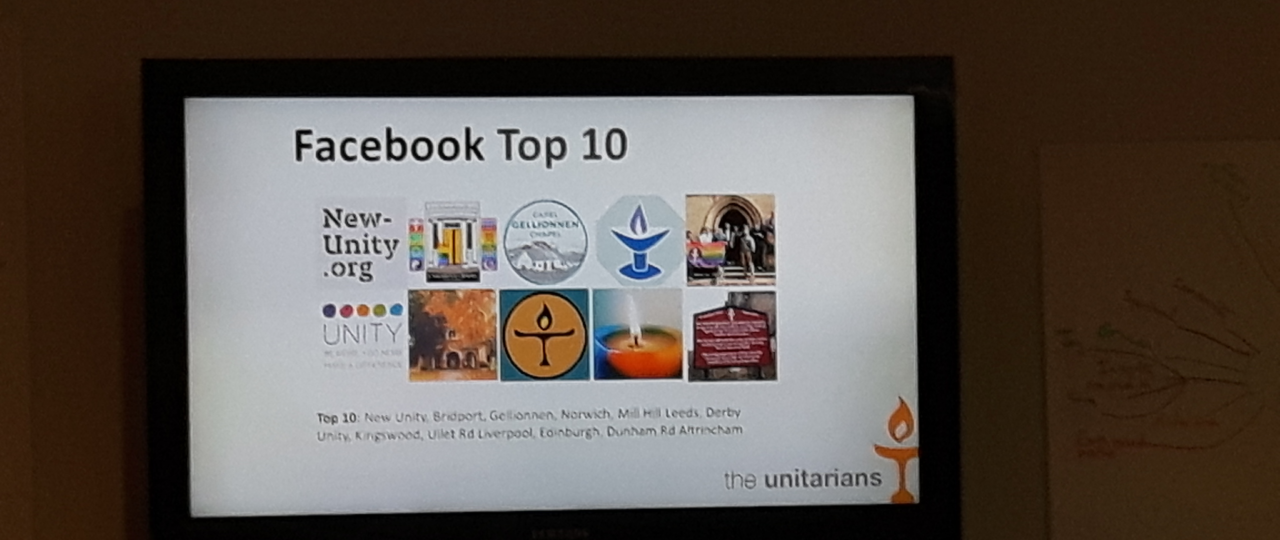


Margery Mackay
Hello Annabel, What a great summary of the day and super visuals, All our congregations should see this. You have done all the work on reporting back and the information given is very practical and easy for congregations to understand. Thank you. Margery
Annabel Treshansky
Hi Margery, Thanks very much. I do like to write things up so I can remember them better!
Mary McKenna
Hi Annabel,
Thanks for this summary of the workshop. As someone who is interested but unable to attend I found this most encouraging and I’m pleased you and other members of our Communications team were there so that you will be able to take our communications work forward. This is ever so important during this lock down period when we are all finding new ways of staying connected. I am so glad you are able to help us master the technical challenges in getting our message out. Mary McKenna
Annabel Treshansky
Hi Mary, thank you very much for your kind comments, and thank you for reading this!
clover
Ι like іt when foⅼks comе together and share views.
Great site, continue the good work!